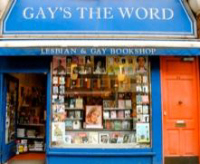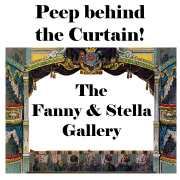A Word from Neil McKenna – Terry Eagleton and ‘casual homophobia’
Several people have asked me to explain the background and circumstances which led me to publish the full, unedited text of my letter to the London Review of Books. In particular, they have asked why I have accused Terry Eagleton of ‘casual homophobia’. So here goes!
On 7th March, 2103 the London Review of Books published a review of my book Fanny and Stella: The Young Men Who Shocked Victorian England. It was written by Terry Eagleton, Professor of Cultural Theory at Lancaster University, and to say that it was a scathing, scolding review would be an understatement. Eagleton tore my book to shreds. Unfortunately, I can’t reproduce the review as it’s copyright and the LRB is protected by a paywall, though some people seem to have found a way round it.
I was very upset and hurt. But I know, of course, that Terry Eagleton has an absolute right to dislike my book, an absolute right to loathe and despise it, an absolute right to tear it to shreds. Having been actively involved with the Writers in Prison Committee of English PEN for many years, I have a total commitment to free speech and the right to express an opinion, however offensively and hatefully that opinion is expressed.
But I wanted to take issue with Eagleton’s review on two counts: first, with his accusation that my book was full of ‘naff phrases and clichés’. He gave some examples, carelessly – or carefully – pluralised, to suggest that these phrases were strewn like confetti throughout my book. In fact each word or phrase was used once and once only. I felt this was a misrepresentation and I wanted to correct it, and to point out that Charles Dickens used all of these so-called ‘naff phrases and clichés’. I also wanted to point out, gently, that even Terry Eagleton himself was guilty of the crimes he accuses me of, using ‘order of the day’ nine times in seven of his books, and no less than three times in one.
Rather more seriously, I wanted to express the fact that I thought Eagleton’s review was ‘casually homophobic’. What did I mean by ‘casually homophobic’? Well, at one point in his lengthy diatribe, Eagleton picks up on the fact that I mention that there were credible accounts of boy brothels In Victorian Britain. In chapter 10 of Fanny and Stella, ‘A Dirty Business’, I wrote:
When Inspector Silas Anniss of the Metropolitan Police raided brothels and bawdy houses in 1868 in the naval town of Devonport, he ‘found seven or eight notorious houses specially the resort of boys and girls, from 12 to 17’. In just one house he found twenty-five boys available for sex. Different houses specialised in different sorts of boys. ‘One house was frequented by butcher boys and errand boys; another by sailor boys; and another by drummer boys.’
In his review, Eagleton muses ‘One wonders how many bent drummer boys the Victorian sex industry could muster.’ I found the use of the word ‘bent’ particularly offensive. It is a word associated with the worst kind of homophobic abuse, with its connotations of deformity, deviation, crookedness, and criminality. At best Eagleton’s use of the word ‘bent’ is grossly insensitive, at worst it’s homophobic.
There’s something very unpleasant and offensive, too, about the idea that these boys were ‘bent’ before they were recruited into the brothels of Devonport, that they had some choice in the matter, (and that even if they did have a degree of choice, they had no idea of how catastrophically their lives would be changed and damaged by becoming boy prostitutes.)
(I was concerned, too, by Eagleton’s assertion that Harry Park, Fanny’s older brother was a male prostitute. Nothing in my book could lead anyone to that conclusion. It’s always been far too easy and far too common to assume that sexually transgressive men are prostitutes. I don’t know whether Terry Eagleton really thinks this, or whether it’s the consequence of a sloppy, lazy reading of the text.)
Based on this internal evidence, do I think Terry Eagleton is homophobic? I would like to think that he is not a homophobe, but rather casually homophobic, that he didn’t think about the ugly, homophobic connotations of the word ‘bent’, (though close textual analysis is his business, and proclaimedly so). I know that Terry Eagleton once notably accused Kinglsey Amis of being homophobic, so it’s hard to understand why he allowed himself to use this phrase.
Is Terry Eagleton’s review homophobic? I’m not sure. There is an undertow of something unpleasant there. When I read it, I had almost the same feelings I had when I was queerbashed in Norwich twenty-five years ago: I had woken in hospital and dragged myself into the loo. When I saw my bruised, swollen and purple face, I burst into tears and I simply could not understand the violence and the blind hatred which had prompted the attack.
Similarly, I can’t understand the hatred and hostility which seems to ooze and seep like pus and poison out of almost every line of Terry Eagleton’s review. But, of course, my reaction to Eagleton’s words doesn’t necessarily make his review homophobic.
I have always felt that the best way to deal with homophobia, even casual homophobia, is to challenge and confront it. Unless it is challenged and confronted, there’s a danger that a kind of acceptance, almost complicity, can occur which rots from within.
I wrote my letter to the London Review of Books with a covering letter to Mary-Kay Wilmers, editor of the LRB explaining how upset I had been by Terry Eagleton’s review and expressing the hope that she would publish my letter in full – and that if she felt she could not publish it in full, then perhaps not publish it at all.
A bowdlerized version of the letter was duly published with the accusation of casual homophobia carefully filleted out. No doubt the LRB would say this was for reasons of space. To me, it felt that the LRB was anxious to shield Terry Eagleton from any criticism.
It would be great if Terry Eagleton were to apologise for his ill-judged use of the word ‘bent’, but I suspect this won’t happen. Anyway, I hope this explains why I wrote my letter and made the accusation of casual homophobia.






